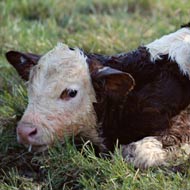Unrelated twin calves born at dairy farm

Although the two calves were born from the same mother, they are not genetically related. (stock photo)
A pair of unrelated twin calves were born at a Gloucestershire dairy farm recently, farm vets have reported.
Farmers were surprised to discover the Holstein cow was about to give birth to two calves when she calved on 21 April. But they were even more shocked when they discovered one of the calves was a Belgian blue cross and the other was a Simmental cross.
According to Farmers Weekly, the cow had been artificially inseminated with Simmental semen, making her the mother of one of the calves. A 'cow stopper' was implanted by Tyndale vets seven days after service to help her conceive.
A cow stopper is an embryo implanted into a cow that has failed to conceive naturally. Although the two calves were born from the same mother, they are not genetically related; the embryo came from a donor dam and sire.
Farm vet David Preece from Tyndale said the occurrence was quite rare. "The practice itself is quite unusual and it is very unusual for both embryos to survive," he told Farmers Weekly.
Both calves are said to be healthy and doing well.



 RCVS Knowledge has welcomed Professor Peter Cockcroft as editor-in-chief for Veterinary Evidence.
RCVS Knowledge has welcomed Professor Peter Cockcroft as editor-in-chief for Veterinary Evidence.